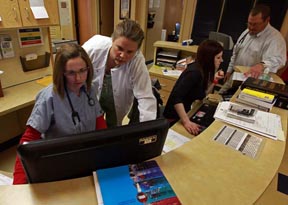 MONROE CITY, Mo.: A patient walks into Hannibal Clinic’s Monroe City location complaining of chest pains.
MONROE CITY, Mo.: A patient walks into Hannibal Clinic’s Monroe City location complaining of chest pains.
When initial assessment shows the patient is having a heart attack, staff call 911 and quickly work to stabilize the man until the ambulance arrives.
“There’s a lot of days I say we’re like a mini ER up here,” said Mindy Hufford, a licensed practical nurse in the Monroe City, Mo., office. “We do what we were taught in nursing school. It all goes back to our training.”
That’s often the truth in many rural areas, where the nearest hospital, emergency room and even ambulance, can be miles away.
Monroe City has an ambulance, but the nearest hospital – Hannibal Regional – is 20 miles away.
“We kind of have to be the middleman,” said Cindy Cassens, clinic manager at Blessing Hospital’s East Adams Rural Health Clinic in Golden, where the nearest ambulance is in Mendon or Camp Point and the closest hospital is in Quincy, Illinois.
“A lot of times we’ll have patients stop here like they need our permission to go to the ER, or they don’t think it’s bad enough, and they’re having a heart attack or having a stroke. We’ve had them come in with horrible cuts and lacerations wanting us to take care of it or push them forward where they need to go,” Cassens said. “We have to triage here and do a plan of care.”
Patients often turn to their regular doctors and nurses – the people they know and trust – instead of seeking emergency room attention elsewhere for everything from stroke symptoms to fishhook injuries, a common summertime complaint in the clinic close to Mark Twain Lake.
“A lot of people don’t have health insurance or don’t have the means to go to the ER,” Hufford said. “It’s easier for them to come up here first. A lot of times they want reassurance they need to go, that it’s not something the family doctor can take care of. People have a lot of trust in their family doctor.”
The clinic’s Dr. Rodney Yager and the nursing staff provide family practice care for everything else, from well children visits to lacerations and head injuries, colds and flu to monitoring chronic conditions like diabetes and high blood pressure. The clinic also provides EKGs, shots, orthopedic care, lab work and X-rays. CTs, ultrasounds and MRIs need to be done at the main clinic – and emergencies usually get transported to Hannibal Regional.
“We’re making the call (to the ambulance) and getting everything ready to be shipped out with the patient – the things we logged, the meds list, allergy list, EKG, any triage stuff that we’ve done – we make sure they have a copy to go with them – and contacting family if it’s a patient here by themselves.
By the time we get halfway through all that, they’re here (the ambulance),” Hufford said.
“I can’t give enough kudos to our EMS. We always have the first responders. We know the ambulance folks here on a first-name basis,” Hufford said. “They’re wonderful. They take excellent care of patients, get them stabilized, get them where they need to go.”
In an emergency situation, response time is critical – both at the clinic and with EMS.
“It changes our mode of what we’re going to have to do with a patient if EMS isn’t readily available,” Cassens said. “You’ve got to be really on the ball as far as you may not always do what you might normally do. You have to kind of make adjustments.”
It’s an important role for the clinic staff – and one they continue to play even as the ambulance heads to the hospital.
“We’ve called ahead to the emergency department, told them what’s coming in so they can be prepared,” Cassens said. “We give them background.”
Hufford said the Monroe City office sees 30 to 50 patients a day and averages an ambulance transfer, mostly for heart attack or stroke patients, once every two weeks.
The variety of care appeals to Hufford, who worked for the Hannibal Clinic in pediatrics and surgery before shifting to the Monroe City site a year and a half ago.
“It’s not the same old, same old every day. Even if you have nothing adrenalin-rushing coming through the door, every day there’s a question come up that you don’t know the answer to that you need to ask the doctor about,” she said. “One good thing about family practice is you’re always learning.”
In 23 years at the Golden clinic, Cassens has seen her share of emergency situations.
“It’s never a dull moment here. That’s for sure,” she said.
Underlying the unpredictability of the job is the day-to-day satisfaction for the nursing staff.
“We do our job. We take care of our patients,” Hufford said. “At the end of the day, you know you really made a difference in people today whether you gave them a shot to make them feel better or got them the results they needed. You’re constantly helping someone, making a difference in their day.
That’s the most rewarding for me. That’s what makes the day worthwhile.” -AP






